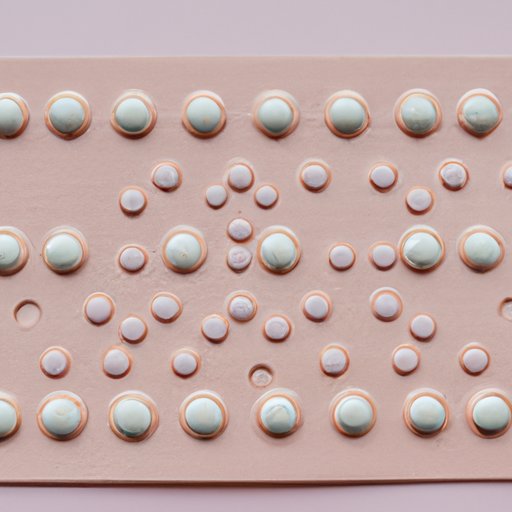Introduction
Birth control pills, also known as oral contraceptives or “the Pill,” are a form of contraception that has been used for decades to prevent pregnancy. Birth control pills contain hormones that stop ovulation, which prevents the release of an egg from the ovary. Birth control pills can be an effective way to prevent pregnancy if taken correctly. However, it’s important to understand how they work and the potential risks associated with taking them.
Exploring the Science Behind Hormonal Birth Control Pills
Hormonal birth control pills contain synthetic forms of estrogen and progestin, which are hormones naturally produced by the body. These hormones affect fertility by preventing ovulation and altering the cervical mucus and endometrium (lining of the uterus). By changing these factors, hormonal birth control pills make it difficult for sperm to reach the egg and fertilize it.
How Birth Control Pills Affect a Woman’s Body
Birth control pills have several effects on a woman’s body. First, they stop ovulation, which is the process of releasing an egg from the ovary. Without an egg being released, there is nothing for sperm to fertilize, so the chances of getting pregnant are greatly reduced. Additionally, birth control pills alter the cervical mucus, making it thicker and less hospitable to sperm. Lastly, they thin the lining of the uterus (endometrium), which makes it harder for a fertilized egg to implant and grow.

Examining the Different Types of Birth Control Pills
There are several types of birth control pills available, each with its own set of benefits and risks. Combination birth control pills contain both estrogen and progestin and are one of the most common types of hormonal contraceptives. Progestin-only birth control pills contain only progestin and are recommended for women who cannot take estrogen, such as those who are breastfeeding. Extended cycle birth control pills are designed to reduce the number of periods a woman has in a year.
Common Side Effects of Taking Birth Control Pills
Although birth control pills are generally considered safe, there are some potential side effects that should be taken into consideration. Common side effects include blood clotting, weight gain, and mood changes. It’s important to talk to your doctor about any potential side effects before starting a birth control pill.

Understanding the Mechanism of Action of Birth Control Pills
The mechanism of action of birth control pills is complex and involves several steps. The first step is to prevent ovulation. This is done by suppressing the production of hormones that cause the ovaries to release eggs. The second step is to thicken the cervical mucus, making it more difficult for sperm to reach the egg. Lastly, the third step is to thin the endometrium, making it harder for a fertilized egg to implant and grow.

Comparing the Effectiveness of Different Birth Control Pills
The effectiveness of birth control pills varies depending on several factors, including the type of pill, how often it is taken, and whether or not it is taken correctly. In general, combination birth control pills are more effective than progestin-only pills, and extended cycle pills are more effective than traditional pills. It’s important to talk to your doctor about the best option for you.
Conclusion
Birth control pills are an effective way to prevent pregnancy if taken correctly. They work by preventing ovulation, thickening cervical mucus, and thinning the endometrium. There are several types of birth control pills available, each with its own set of benefits and risks. It’s important to talk to your doctor about the best option for you and any potential side effects before starting a birth control pill.
(Note: Is this article not meeting your expectations? Do you have knowledge or insights to share? Unlock new opportunities and expand your reach by joining our authors team. Click Registration to join us and share your expertise with our readers.)
